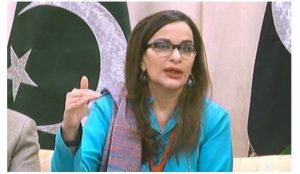Climate Change Risks Make Pakistan the Ground Zero of Catastrophe: Minister
Climate Change Risks Bring to Water Scarcity in Pakistan
ISLAMABAD: The climate changes risks have made Pakistan the ground zero of climate catastrophe where life on earth, water and under-water has been impacted at exponential levels, making the country a perfect example of all the disasters that come with climate stress, Pakistan’s Climate Change Minister, Sherry Rehman made these remarks while participating in discussions at the Petersberg Climate Dialogue VII held in Germany, and co-hosted by Germany and Egypt.

The main focus of the two-day event, wherein senior officials from 40 countries met Monday in Berlin, for heart-to-heart talks on how to stay focused on fighting climate change and addressing its impact. The delegates informally discussed how the ratification and execution of the Paris Agreement could be realised in a timely and adequate manner.

Sherry Rehman was leading a Pakistan delegation comprising of officials including Asif Haider Shah, Secretary MoCC, Mujtaba, Senior Joint Secretary, Ms Sayyeda Hadika Jamshed, Climate Change Policy Specialist and Dr Saima, Director MoCC.
Highlighting the Pakistan’s extreme vulnerability and multitude of risks caused by Climate Change, Minister said “Damage to agricultural productivity, livelihoods, human health and economic stability have led to irreversible impacts including massive internal displacements as well as GDP losses that go as high as 9.1% (UNESCAP),”.
“We must hope for a better future, but hope is not a plan. Global pledges must go further, and they must translate into planning and accessible funding pipelines for operationalising our joint goals,” she further added.
Speaking to media, Germany climate envoy Jennifer Morgan, told The Associated Press, “Many of the poorest and most vulnerable countries in the world are experiencing severe climate impacts now,”. He further added by saying “The question is how to support them in both adapting to those impacts and when they experience real losses and damages. We must also show more solidarity.”
Highlighting the financial constraints of developing countries regarding Climate Change, Sherry Rehman said the Global South is looking now for a robust financial mechanism to actualise its goals on the ground, where a transfer of resources goes beyond pledges and promises. In fact, she said, it is troubling to countries like us that so far pledges for loss and damage compensation have also not been made at all.
Global observers say many developing countries are still waiting for rich nations to provide $100 billion in climate aid each year, a target they were meant to reach by 2020.
Organizers said the two-day gathering was as an opportunity to rebuild trust between rich and poor nations ahead of this year’s U.N. climate summit being held in Egypt, after technical talks last month achieved little progress on key issues such as climate aid for developing countries.
“It is incumbent upon us in these uncertain times to act swiftly to ensure that climate action remains at the top of the international agenda, and that the current state of affairs is not taken as a pretext to backtrack or renege on previous commitments — especially those related to supporting developing countries,” said Egyptian Foreign Minister Sameh Shoukry, who will chair the Sharm el-Sheikh summit.
China was taking part in the Berlin meeting. Russia was not invited.
By Muhammad Arif







